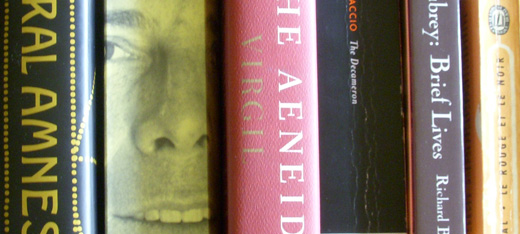Monday: Morning Read
James Merrill or Wallace Stevens? I recall some loose talk about adding the latter’s Harmonium to the list, but Merrill’s Collected Poems has yet to be shelved. Reading the first two poems of First Poems, however, I find myself distracted by low-grade problems relating to the new computer. I shall have another go in the morning.
¶ In the Decameron, VII, vii, a moment of rare excitement. Lodovico, posing as a servant in the household of the woman he adores, is told to visit her at her bedside in the middle of the night. When he does so, she grips his hands firmly and wakes up her husband! Imagine the young man’s feelings as he hears her apparent denunciation:
“I too considered him the most faithful of your servants. But he has undeceived me, for yesterday, when you were out hawking and he stayed behind, he had the impudence, thinking it a good opportunity, to propose that I should minister to his pleasures. And so that I should have no difficulty in providing you with tangible and visible evbidence of all, this, I gave him my consent and told him that I would…”
But you’ll have to read the rest yourself.
¶ In the Aeneid, Turnus makes his way into the Trojan camp and slaughters lots of notables, among them Pandarus, who is not the famous Pandarus, who, for the matter of that, was not famous in antiquity for being a pander — that was a medieval invention, popularized by Chaucer. Goodness, this warfare is wearisome. At the end of Book VIII, at any rate, Turnus escapes by diving, armor and all, into the Tiber. The bloodthirty fun’s not over yet!
¶ In Aubrey, the Danvers family — relations of the author, implicated in a celebrated murder case that neither Aubrey nor his editor can be bothered to explain. (The victim was one Henry Long) — the Edward Davenants, father and son, and also the father’s brother, John, sometime Bishop of Salisbury; and (no relation, it seems) Sir William Davenant, the poet and librettist, who liked to claim, we’re told, that he was the deposit of none other than “Mr William Shakespeare,” who used to stop at his parents’ house on his annual visit from London to Stratford. And a brief note on Michael Davy, a mathematician, gunner, and tobacco-cutter whose fingers “rotten and gangrened” from writing “in frosty weather.” Memorandum: ask round to inquire if this could happen when typing in frosty weather.
¶ The title of Le rouge et le noir refers, of course, to the two career paths that tempt Julien Sorel: the military or the clergy. As his sojourn at the de La Mole household wears on, however, one begins to wonder what color Stendhal might have chosen to signify the diplomatic corps. Julien is taken by the marquis to a meeting of conspirators, where he writes down what he hears with a view to summarizing it in four pages of MS that he will memorize and repeat in a distant city. What excitement!
¶ Clive James on Carl Zuckmayer, an eminence of the Weimar theatre who later noted how few of his gifted Aryan colleagues made significant contributions during the Nazi regime. Ever the scorekeeper, James does not miss the chance to take a shot at two complacent musicians, Herbert von Karajan and Elisabeth Schwarzkopf (whose sin is compounded by her residence in a luxury flat formerly owned by Jews).

